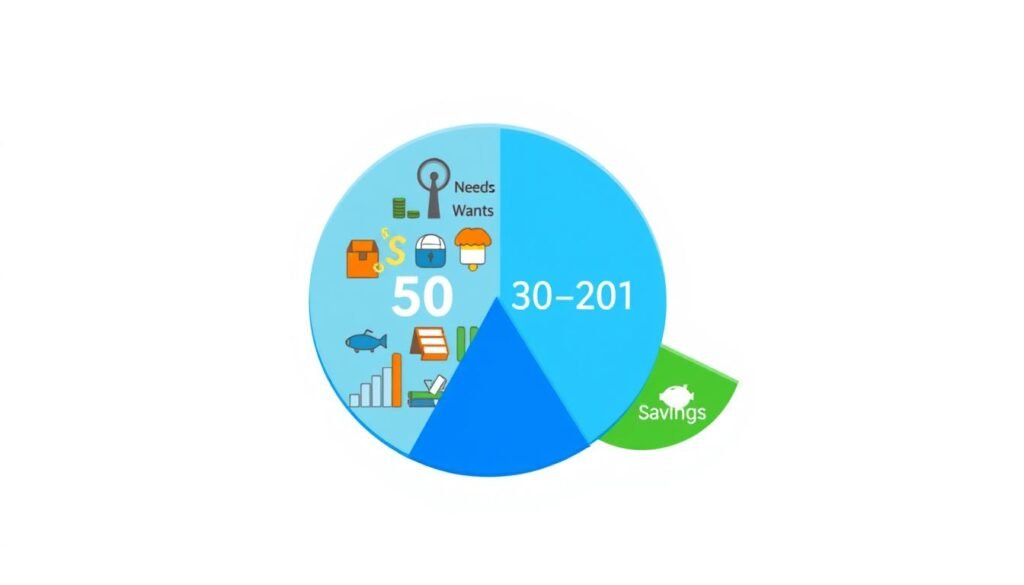Imagine not worrying about unexpected costs because you have a solid budgeting plan. Mastering money is possible with guidance and effort. Feeling overwhelmed by personal finance is common. Yet, financial freedom and wealth are possible for everyone.
Budgeting changes financial chaos into an organized plan. Imagine saving for emergencies, comfortable retirement, or a dream journey. Andrew Giancola, a financial expert, says anyone can improve their finances with some basic knowledge.
There’s a story about someone who saved $1700 for car upkeep in eight months by sticking to a budget. It proves disciplined budgeting works, even if you’re not a finance expert. By saving for the unexpected, retirement, and short-term wishes, and tracking expenses, you secure your financial future.
Table of Contents
ToggleKey Takeaways
- Grasping personal finance is essential for financial independence and wealth.
- Budgeting makes financial chaos manageable, reducing stress.
- It’s important to save for emergencies, retirement, and short-term aims.
- Good budgeting helps achieve financial dreams, like big buys or holidays.
- Budgeting tools and trackers help manage money well.
- Andrew Giancola believes mastering money is achievable with proper principles and hard work.
Understanding the Importance of Personal Finance
Personal finance is vital for long-term financial security and financial freedom. Managing your money well increases your financial knowledge. This leads to smarter choices and independence.

Household debt rose by $3.7 trillion since December 2019, reports the Federal Reserve Bank. This jump shows why planning finances is essential. Credit card debt and auto loans have also gone up, needing careful management.
Consumer loans and store card debt increased by $1 billion. Non-housing debt and mortgages went up significantly. With student loans steady at $1.6 trillion, understanding personal finance is crucial for handling debt.
- PSBT offers various savings accounts like MaxEarnings Saver, Anytime Savers Club, Everyday Saver, Student Saver, and Online Savings Account for different needs.
- These accounts focus on financial planning and promote safe growth of savings over time.
- The Student Saver account is designed for students under 22, showing the value of early financial habits.
The 2022 Investopedia Financial Literacy Survey of 4,000 adults found big worries. Americans are concerned about personal finance basics, retirement, and crypto investments. Addressing these issues can enhance financial life and help achieve financial freedom.
| Debt Type | Increase (2024) |
|---|---|
| Household Debt | $3.7 Trillion |
| Credit Card Balances | $27 Billion |
| Auto Loans | $10 Billion |
| Consumer Loans & Store Cards | $1 Billion |
| Total Non-Housing Debt | $28 Billion |
| Mortgages | $77 Billion |
| Student Loans | $1.59 Trillion |
To build financial stability, get smart about personal finance. Focus on managing debt and using savings accounts for your goals. This way, you can control your financial future and aim for financial freedom.
Steps to Create an Effective Budgeting System
Making a good budgeting system is key to reaching your financial dreams. It helps you manage your money well. Follow these steps to create a strong base for your finances.
Assess Your Financial Situation
To start, look closely at your money situation. Write down all the ways you make money. This includes your job, side gigs, or other income. Then, list all your spending, fixed and changing costs alike. By knowing your total income and spending, you’ll see where changes might be needed.

Set Clear Financial Goals
Understanding your finances helps you set clear goals. Goals should be SMART: specific, measurable, achievable, relevant, and time-bound. First, sort out which goals are most important. Financial experts suggest saving $500 for emergencies and saving 15% of your pay for retirement. These goals help keep you motivated.
Choose a Budgeting Method
Now, pick a budgeting method that fits your style. The 50/30/20 rule is one good way. It suggests spending 50% of your income on needs and 30% on wants. The rest, 20%, should go to savings and paying off debts. This balance helps you take care of now and plan for later.
There are other methods too, like zero-based budgeting and the envelope system. Make sure to update your budget as things in your life change. This ensures you keep moving towards your financial goals.
Implementing the 50-30-20 Rule for Budgeting
The 50-30-20 rule helps organize your after-tax income. It divides your money into three parts: needs, wants, and savings. This way, managing expenses becomes easy. You can save more effectively too.

Breaking Down Your Income
Here’s how to use the 50-30-20 rule on your income. It’s divided after taxes into three sections:
- 50% for needs: This covers essential items like housing, utilities, and food.
- 30% for wants: This is for fun things like movies, eating out, and trips.
- 20% for savings: Put this towards your emergency fund, retirement, and paying off debt.
Want to know more? Learn more about how this simple plan can help you.
Classifying Needs vs. Wants
It’s important to know the difference between needs and wants:
- Needs: These are must-haves for daily life, like a home and food.
- Wants: These are extra things you enjoy but don’t need, like a gym pass or dinners out.
Knowing what’s a need and what’s a want makes budgeting easier. You spend less on unnecessary stuff. This means more money for your savings goals.
The Role of Savings and Debt Payments
Use 20% of your income for savings and debts. It’s key for an emergency fund and retirement savings. Regular savings help you hit financial goals faster.
Think about different ways to save, like in an IRA or a 401(k), too. Here’s how to focus this part of your money:
| Savings Goals | Description |
|---|---|
| Emergency Fund | Save 3-6 months of what you spend for emergencies. |
| Retirement | Add money to a 401(k) or an IRA. |
| Debt Repayment | Pay more than the minimum on your loans. |
With the 50-30-20 rule, managing money gets simpler. It helps you cover important costs, enjoy life, and save for the future. This rule works for any budget, making financial wellness reachable.
Learn how to adjust the 50-30-20 rule to your needs. It’s flexible for different incomes and goals. Using it can make a big difference in financial health.
Utilizing Budget Apps for Expense Tracking
Managing personal finances is super easy today thanks to budget apps. These apps help you keep track of your spending, save money, and meet your financial goals. They allow you to automatically track your finances, categorize expenses, and manage your budget with no hassle. Let’s look at the best budgeting apps and their features that can change the way you handle your money.
Top Budgeting Apps for Personal Finance
Finding the right budget app can really improve your money management. Here are some top personal finance apps recommended for you:
- You Need A Budget (YNAB) – Great for goal-setting, YNAB offers a 34-day free trial and costs $109 a year. Users typically save $600 in two months and $6,000 in a year.
- Quicken Simplifi – At $3.99 a month, it lets you customize reports for expenses, income, and savings, adjusting your budget on the go.
- Goodbudget – Uses the envelope budgeting method. Goodbudget is free for up to 20 envelopes or $10 monthly for more.
- PocketGuard – Offers a basic version for $74.99 a year, calculating daily spending based on income and goals.
- Expensify – Perfect for business expenses, Expensify has a free plan for up to 25 SmartScans a month, starting at $5 a month for more.
Features to Look for in Budgeting Apps
It’s important to choose a budget app with features that fit your financial needs. Here are key features to look for:
- Real-Time Expense Tracking: This lets you see spending as it happens and keep within budget.
- Customizable Budget Categories: They allow for detailed tracking and analysis of your spending habits.
- Predictive Financial Analytics: Provides insights and predictions on your finances, helping you plan better.
- Bank Account Integration: Automatically updates transactions from your bank, saving you from manual tracking.
- Security Features: Choose apps with strong encryption and monitoring for unusual activity to keep your data safe.
Some budget apps can cost up to $99 a year, with extra fees for more features. It’s key to think about the app’s value against its cost. Many apps also offer educational financial resources, forecasting, investment tracking, and customized reports. These features make them very useful tools for keeping track of your money. Take a look at this detailed to learn more about the benefits and how-tos of budgeting systems.
Strategies for Effective Money Management
Learning how to manage your money well is key to financial stability and security. Use practical techniques and financial tools to keep an eye on your cash flow. This will improve your spending habits. Here are some important methods to help you:
A great method is Pay Yourself First. Put some money into savings before you pay for anything else. This way, you save money regularly without cutting into your spending cash.
The Zero-Based Budget is also smart. With this, you give each dollar a job, like bills or saving, until no money is left. It helps you see exactly where your money goes each month.
Don’t forget about the Envelope Budget. Put cash in envelopes for different spending areas. You can do this with real envelopes or through apps. It’s a good way to stop spending too much money in one place.
- Track your spending with apps like MoneyTrack. Watching how you spend money helps find places to save and keeps you focused on your goals.
- Build up your savings by starting an emergency fund and using automatic savings plans. Tools like FSCB’s pocket change make it easier to save money for the future.
- Pay your bills on time to dodge late fees, boost your credit score, and get better loan rates. Being on time with payments is essential for good financial health.
Make a realistic budget based on how much you make and spend. A good budget lets you enjoy life without falling into debt. Check and change your budget often to keep up with your goals.
Also, look at your subscriptions and cancel any you don’t need. This can lower your monthly costs a lot. It means you keep more of your money.
Try to save money for big buys instead of using credit cards. This avoids interest fees and teaches you to spend wisely.
By following these tips and keeping a close eye on your money, you can have a financially secure life.
Analyzing and Controlling Your Spending
To manage your money well, it’s key to check your spending often. Looking closely at how you use money, you’ll see where you might be overspending. Then, you can cut costs wisely. This way, you make the most of your money and set up a strong financial future.
Tracking Expenses Regularly
Begin by watching your expenses closely. When you write down everything you spend, you learn a lot about your habits. A budget app or a simple spreadsheet can help a lot. By keeping track regularly, you can see where your money goes and notice any spending patterns.
Identifying and Reducing Unnecessary Costs
After you’ve looked at your spending, find places where you can spend less. Maybe eating out or paying for subscriptions takes up too much of your budget. Cutting back on these things means more money for important goals. Like saving for emergencies or putting away money for the future.
Here’s a simple table that outlines potential areas for cost control and their impact on your budget:
| Expense Category | Average Monthly Spend | Potential Savings |
|---|---|---|
| Dining Out | $300 | $150 |
| Subscription Services | $50 | $30 |
| Coffee Purchases | $75 | $50 |
| Entertainment | $100 | $60 |
Doing a good job of watching your spending and being smart about cutting costs can really help your finances. By knowing where your money goes and making careful choices, you’re on your way to a better financial future.
Setting and Achieving Your Savings Goals
It’s vital to set realistic savings goals for financial success. Knowing the difference between short-term and long-term objectives helps. With creative strategies, reaching your financial goals becomes easier.
Short-Term vs. Long-Term Savings Objectives
It’s essential to organize your saving goals. Short-term financial goals are things you can achieve in under five years. This includes savings for an emergency fund, a vacation, or an engagement ring.
Long-term financial goals take more than five years and can include retirement savings, buying a car, or college costs for kids. Both need a good budgeting plan for steady progress.
Setting clear, trackable goals is crucial. Like having a goal to save a specific amount by a certain date. This creates urgency and fights off delays. Experts suggest saving 2 to 4 times your annual income by 45 for retirement.
Creative Ways to Save Money
Setting up auto-transfers to savings accounts helps you save without thinking. A 2023 poll showed 85% budget, highlighting structured saving’s role in financial health.
Start small to feel progress quickly. Saving a set amount monthly for goals like home improvements boosts discipline. This builds a strong saving habit over time.
Here are some creative saving tips:
- Create separate savings accounts for different goals.
- Track expenses with budget apps to find savings.
- Earn extra with a part-time job or side hustle.
- Grow your savings faster with compound interest accounts.
- Put surprise money, like tax refunds, into savings.
Reaching savings goals is a long journey. What suits one person may not fit another, so personalize your approach. Keeping track of your goals boosts your chance of success.
Understanding the different savings objectives and using creative strategies puts you on the path to success. With confidence, you’ll achieve your financial dreams.
“It’s not about having a lot of money. It’s about knowing how to manage it.”
Conclusion
Wrapping up, disciplined financial planning is vital for wealth and stability. It involves understanding personal finance, setting goals, and picking the right budget method. This groundwork is crucial for managing your finances well.
Using the 50-30-20 Rule and budget apps helps track expenses easily. It lets you sort needs from wants and prioritize saving and paying off debt. Strategic planning and constant spending review lead to better money management. This sets the stage for financial success.
To reach your savings targets, mix short-term and long-term plans. Creative saving strategies greatly improve financial health. Remember, budgeting and financial planning are ongoing. They need regular checks and tweaks to match new situations and rules.
Use tools like the Government Performance and Results Act Modernization Act of 2010. Staying informed and adjusting your strategy is key to investing in your future. This leads to financial freedom. For deeper insights, see our piece on a strong budget system.
FAQ
What is a good way to start mastering my personal finance?
First, create a strong budgeting plan. This is key to gaining financial freedom and building wealth.
Why is personal finance so important?
Managing your personal finance well is vital for long-term security and freedom. It helps you understand your finances better. This way, you can make smarter choices and become independent.
What are the fundamental steps to create an effective budgeting system?
First, gauge your financial situation. Know your income and expenses. Then, set clear goals that are within reach. Choose a budget method that fits your lifestyle and aims. This is how you build a solid budgeting system.
How does the 50-30-20 rule help in budgeting?
This rule simplifies spending and saving. Allocate 50% of income to necessities, 30% to wants, and 20% to savings or debts. It’s a smart approach to managing finances well.
What are some recommended budgeting apps for expense tracking?
Apps like Mint, YNAB, and PocketGuard are top picks. They are easy to use and packed with features. These apps help track spending in real time, customize budgets, and predict finances.
What strategies enhance effective money management?
Automating savings, checking cash flow regularly, and using financial tools are key strategies. They promote discipline in managing money. These practices lead to a well-organized financial life.
How can I analyze and control my spending effectively?
Keep track of your spending. See where you can cut costs. By examining your spending habits, you can find ways to save money and manage your finances better.
How can I set and achieve my savings goals?
Separate your savings goals into short-term and long-term. Find saving methods that match your financial situation and goals. Setting clear goals helps you hit them more effectively.
Source Links
- Master Your Money Super Bundle 2021 Contents List – https://www.theintentionalmom.com/master-your-money-super-bundle-2021-contents-list/
- Master Your Finances: 5 Personal Budgeting Strategies – First Ohio Home Finance – https://firstohiohome.com/master-your-finances-5-personal-budgeting-strategies/
- A Comprehensive Guide by TBM – https://thebudgetmom.com/building-blocks-of-budgeting
- What Is Personal Finance, and Why Is It Important? – https://www.investopedia.com/terms/p/personalfinance.asp
- Why is Personal Finance Important? – https://www.psbt.com/Learn/Resources/PSBT-Corner-News/Why-Is-Personal-Finance-Important
- How to Budget Money: A 5-Step Guide – NerdWallet – https://www.nerdwallet.com/article/finance/how-to-budget
- Budgeting – https://corporatefinanceinstitute.com/resources/fpa/budgeting/
- The 50/30/20 Budget Rule Explained With Examples – https://www.investopedia.com/ask/answers/022916/what-502030-budget-rule.asp
- What’s the 50/30/20 Budget Rule? – https://www.citizensbank.com/learning/50-30-20-budget.aspx
- 50/30/20 Budget Calculator – NerdWallet – https://www.nerdwallet.com/article/finance/nerdwallet-budget-calculator
- Budgeting Apps: What Are They & How They Work | Equifax – https://www.equifax.com/personal/education/personal-finance/articles/-/learn/budgeting-apps/
- Best Budgeting Apps Of November 2024 – https://www.forbes.com/advisor/banking/best-budgeting-apps/
- 6 best expense tracker apps of 2024 – https://www.cnbc.com/select/best-expense-tracker-apps/
- Popular Budgeting Strategies – https://srfs.upenn.edu/financial-wellness/browse-topics/budgeting/popular-budgeting-strategies
- Improve Your Finances with 7 Money Management Tips – https://www.fscb.com/blog/7-money-management-tips-to-improve-your-finances
- Budgeting Basics: 8 Strategies for Effective Financial Management – CFO Hub – https://cfohub.com/8-strategies-for-effective-financial-management/
- How to Budget Money: Your Step-by-Step Guide – https://www.investopedia.com/financial-edge/1109/6-reasons-why-you-need-a-budget.aspx
- Budget Analysis: 4-Step Guide – Finmark – https://finmark.com/budget-analysis/
- How to Set and Achieve Smart Financial Goals – https://bettermoneyhabits.bankofamerica.com/en/saving-budgeting/setting-and-achieving-financial-goals
- How to Set Financial Goals – https://www.ramseysolutions.com/personal-growth/setting-financial-goals?srsltid=AfmBOoqEgWTRotY-1krEKXzBWY_eKAxjSrjPi-rKoWabkZLNqvc9Xp_W
- How To Set Savings Goals: 6 Tips | Bankrate – https://www.bankrate.com/banking/savings/how-to-set-savings-goals/
- 7 Conclusions and Recommendations | Budgeting for Immigration Enforcement: A Path to Better Performance – https://nap.nationalacademies.org/read/13271/chapter/9
- Microsoft Word – Document7 – https://www.dbm.gov.ph/wp-content/uploads/2012/03/PGB-B2.pdf



